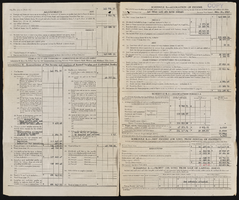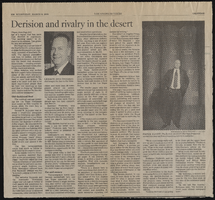Search the Special Collections and Archives Portal
Search Results
Mavis Eggle "Books as They Were Bought" Collection
Identifier
Abstract
The Mavis Eggle "Books as They Were Bought" collection provides a broad overview of printed material from the 1780s through 1949. Gathered by book collector Mavis Eggle, the collection serves as a social history of books, newspapers, and ephemera. Physical characteristics of the books include a variety of printer's marks, publishers' bindings, bookplates, and early subscription libraries. The collection's titles are a diverse and creative gathering of poetry, children' literature, religious texts, broadsides, newspapers, and popular fiction. Together, the items in the Mavis Eggle "Books as They Were Bought" collection illustrate changes in literature, printing and publishing, advertising, and book history over a time period of more than 170 years.
Archival Collection
Lubertha Johnson oral history interview
Identifier
Abstract
Oral history interview with Lubertha Johnson conducted by Larry Buckner on February 10, 1978 for the Ralph Roske Oral History Project on Early Las Vegas. In this interview Lubertha Johnson discusses her family background, work experience, civic activity, and philosophy. She talks about discrimination in the workplace for Black people, segregation in Las Vegas, Nevada, and her forty year membership in the National Association for the Advancement of Colored Peoples (NAACP). She also discusses the historic Westside neighborhood and its schools, the prejudice Black performers faced in the 1950s and 1960s, and how she feels disappointed in President Jimmy Carter.
Archival Collection

Chris Davis, Debbie Davis, and Mynda Smith oral history interview: transcript
Date
Archival Collection
Description
Oral history with Chris Davis, Debbie Davis, and Mynda Smith conducted by Claytee D. White and Barbara Tabach on May 24, 2018 for the Remembering 1 October Oral History Project. In this interview, Debbie and Chris Davis and Mynda Smith discuss the murder of their daughter and sister (respectively), Neysa Davis Tonks, at the Route 91 Harvest Country Music Festival on October 1, 2017. They discuss plans to form Fifty-Eight Loved and Never Forgotten, a foundation to help educate the children of the 58 families affected that night. Neysa, a single mother, left behind three sons, 24, 18, and 15 years of age. The family members recall how they were first alerted to Neysa's death, and having to locate and identify her body at the coroner's office twenty-four hours later. Chris, David, and Mynda reflect on Neysa's life, her work, and legacy. Debbie, Chris, and Mynda believe that "darkness cannot exist in the presence of light. Neysa's light will shine forever."
Text

Transcript of interview with Dorothy Lee by Claytee D. White, June 02, 2016
Date
Archival Collection
Description
Text

Mei Yang oral history interview: transcript
Date
Archival Collection
Description
Oral history interview with Mei Yang conducted by Jourdin Wilson on November 10, 2021 for Reflections: The Las Vegas Asian American and Pacific Islander Oral History Project. University of Nevada, Las Vegas (UNLV) professor and graduate coordinator Mei Yang talks about her family and childhood in Shanxi Province, southwestern China. She shares her educational background pursuing her bachelor's and master's degrees in China before immigrating to the United States to earn her PhD in Computer Science from the University of Texas, Dallas. Mei Yang talks about her move to Las Vegas, Nevada, her work and professorship at UNLV, and her thoughts on pursuing a STEM (science technology engineering math) career as a woman. She shares how she raises her daughters in the United States away from her husband overseas, the Chinese community within Las Vegas, and traditions she celebrates.
Text
Don Ashbaugh Papers on Nevada Ghost Towns
Identifier
Abstract
The Don Ashbaugh Papers (1950-1960) document Las Vegas history, Nevada history, and ghost towns. The collection is comprised of the working manuscript of Don Ashbaugh's book, Nevada's Turbulent Yesterday: A Study in Ghost Towns. The collection also contains typescript drafts, newspaper clippings, and a geographical index of Nevada ghost towns.
Archival Collection
Julio Lucchesi oral history interview
Identifier
Abstract
Oral history interview with Julio Lucchesi conducted by an unidentified interviewer on December 21, 2001. Luchessi discusses his decision to become an architect, as well as his desire to become an aviator. He reads extensively from his autobiography in progess, of his education, his time in the Army Air Corps during World War II, and his decision to move to Nevada. He also talks about the formation and development of the American Institute of Architecture (AIA) in Nevada, his efforts to change the exam process for new architects in the state, and the eleven-year struggle to establish a school of architecture at the University of Nevada, Las Vegas (UNLV) in Las Vegas, Nevada.
Archival Collection
Gloria Dixon oral history interview
Identifier
Abstract
Oral history interview with Gloria Dixon conducted by Claytee D. White on May 2, 2022 for the African Americans in Las Vegas: A Collaborative Oral History Project. In this interview, Dixon recalls her childhood growing up in Las Vegas, Nevada. Dixon attended St. Christopher and Bishop Gorman High School, and recalls her parents' involvement in the New Jerusalem Church. Dixon discusses writing grants to help with community education programs, and using her experience as a hospice nurse for the last thirty years to help communicate information about public health crises. Throughout the interview, Dixon shares information about the businesses in the Las Vegas Black community on Jackson Street.
Archival Collection


